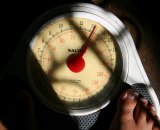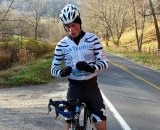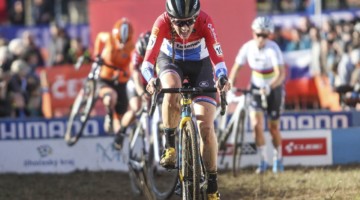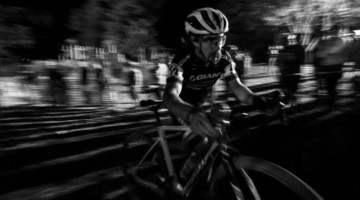
Nutrition and race weight are just as important to cyclocross as they are to any other kind of racing. ©puuikibeach
Nutrition is one of the lesser discussed aspects of cyclocross, so for this classic Training Tuesday column, we sought out an expert in the field to give us some advice for the upcoming season. Matt Fitzgerald is – if you’re a triathlete – a household name. He’s the author of books like Racing Weight: How to Get Lean for Peak Performance and Racing Weight Quick Start Guide, along with 13 other books covering topics in running and triathlon. Fitzgerald also writes for Competitor, Triathlete, Inside Triathlon and Competitor.com. We also profiled the newest edition of Racing Weight in our Summer Reading List.
Because no one has written much on nutrition for cyclocross racers, we at Cyclocross Magazine decided to ask Fitzgerald for some cyclocross-specific advice. As ’crossers, we have interesting nutritional needs: we race in all types of temperatures and climates, we go hard for 45 minutes to an hour two days a week and then recover to do it all again, and of course, we do love the beer tent. We’re a nutritional enigma, trying to eat healthy while surrounded by waffle carts and chocolate-covered bacon, and trying to stay svelte for a long season that often isn’t a racer’s primary focus is a challenge in and of itself. It gets even harder when racers’ schedules demand a lot of recovery and travel time, and little time for long hours on the bike. Luckily, Fitzgerald has some tips for us.
Cyclocross Magazine: First of all, what got you into studying and writing about nutrition and athletes in the first place?
Matt Fitzgerald: I came into it accidentally. I was always going to be a writer. I was a runner and triathlete and happened to bring the two together back in the mid-90s after college. I started writing about endurance sports and focused on the training side initially. As time went by, I developed an interest in the nutrition side. I was an English major in college, so I learned mostly through the experts who are in the labs doing studies and such — I called them up and had them dumb it down. Later, I went back to get my sports certification. It was an organic process.
CXM: You’ve seen cyclocross: a hybrid of road and mountain biking, with plenty of opportunities to get off the bike, pick it up and run with it. How would the “ideal build” shift when looking at a cyclocrosser compared to a road cyclist? [Fitzgerald covers the idea of an ideal body type for cyclists in his book Racing Weight.]
MF: With sports, if you change the discipline even slightly, a different breed of athlete will float to the top. There’s been research done on the bigger disciplines about what the best body type is, and I don’t know if that’s been done in cyclocross yet. If you looked at a pool of 100 cyclists and had them race a variety of different races, you’d have different athletes win in the different disciplines. In cyclocross, body weight is less of a concern overall. That said, in any endurance sport, body weight is important. It would be interesting to see how the ideal cyclocross body compares to the ideal for mountain bike or road.
CXM: In Racing Weight, you give some great advice on how to achieve your goal weight for a race. What advice would you give to cyclocrossers who have to be in race shape from September until January?
MF: I would think you’d want to set your sights on attaining your optimal race weight towards the end of that season. Racing weight tends to follow fitness, so there are those people who for genetic reasons don’t fluctuate much at all. For most people, when you’re at base fitness, you’re not at optimal racing weight. You’re only dialed in when you’re at peak fitness. If you naturally gain a few pounds in off-season and start a little off, that’s probably for the best. It’s similar to risking peaking too early. It might be a sign that you’re ahead of schedule.
CXM: What about those who race road as well, so their seasons run March-August, then September-January? Should they make weight concessions?
MF: It’s just a case of finding a sustainable body weight and fat percentage that is close to “razor’s edge ideal” — right on the edge of being too lean. People who race year-round are in good shape all the time, but only hit race weight at key moments. If you’re racing year-round, you’re never going to want to let yourself go. I’m within three pounds of my “razor’s edge” optimal racing weight; I can sustain that. I don’t get sick; I don’t feel like I can’t handle as much training. Then at those moments when you want to peak, then you can kind of lean out that last little bit.
CXM: What are some of the best tips or tricks you have for cyclists to maintain race weight during the season?
MF: Of course, read Racing Weight! But really, the number one thing is maintaining a very high diet quality — it’s a concept that isn’t discussed nearly enough as the most important consideration, not just in body weight but in good nutrition overall. Just focus on maintaining a high-quality diet at all time. High-quality equals low nutrient density.
There’s also managing your appetite — when in heavy training, your appetite will increase. It’s the calorie compensation effect. There can be a psychological tendency to want to reward yourself. No one should have to go hungry; you can’t override your appetite. Recognize how to eat enough to keep hunger satisfied, but don’t let that lead to an excess of calories. Think high-quality, well-timed meals.
CXM: If a cyclist is trying to lose weight for the season, when is the best time — before or during?
MF: My philosophy on that, and the whole reason I wrote the sequel to Racing Weight, is that it’s impossible to maximize fitness gains with fat loss at the same time. When in heavy training and trying to gain fitness, you need to make sure you’re getting enough calories to maintain that training. But if you don’t have that pressure, you can focus on fat goals. Those two goals are at cross purposes. I recommend a quick start phase to your race weight immediately before your formal training begins. You won’t necessarily get all the way to race weight, but you’ll get a head start.
CXM: What are your top meal suggestions for a cyclist trying to eat healthy?
MF: There’s so much variety! I’m really big on fish — we eat a lot of seafood. There’s a premium on carbohydrates when you’re in heavy training: Whole grain sources are the ones that are really best for that. They’re concentrated but there’s a lot of good stuff in there. We do a lot of brown rice, quinoa, amayrnth, a lot of alternative grains. Whole grain pasta is good.
CXM: Best pre-race food?
MF: You just want to top off your carbohydrate stores in your body but also have a relatively empty stomach. A normal size full meal eaten three hours before your race is the sweet spot. You want it to be very high in carbohydrates, low in just about everything else, easily digested. Some of the things that work well for a lot of people: oatmeal, bananas are great. Sometimes I do liquid nutrition like Ensure or meal replacements. A lot of people have a nervous stomach, so sometimes the liquid nutrition can be a good way to go.
CXM: Best post-race food?
MF: People say, “be sure to do xyz,” but that stuff only really matters if you’re trying to return to heavy training as fast as possible. If you’re going to take a little bit of a break, if you’re going to recover, chill out. Have a couple beers, a piece of cake, whatever. But if you have another race the next weekend and want to return as fast as possible, number one: get nutrition in as soon as possible, rehydrate with anything other than alcohol, get carbs to quickly replenish glycogen stores, eat a little protein for tissue repair. Often people aren’t hungry the first two hours after races, so you can do a recovery drink or if you want something more substantial, yogurt, a bowl of cereal, whatever might be accessible in the first hour after a race. You can combine fruit and nuts to get that balance of carbs and protein, a sandwich could do it. Avoid things that are fatty, it’ll slow absorption.
CXM: What are some of the healthiest training food options? Should a racer go natural with bananas, or are gels and sports drinks the way to go?
MF: The normal rules of everyday nutrition are suspended during exercise. You’re not taking in nutrition for health, per se, you’re taking it in for performance. And there’s been tons of research done on what will help performance during exercise. I recommend that you use the products that were designed for that. It’s all about performance.
CXM: And what about the beer feed during the race?
MF: I would say it depends on your goals. From a performance perspective, I do not recommend beer consumption during the race.
CXM: A lot of cyclocross racers that I know are vegetarian/vegan. Any specific suggestions for them?
MF: Often the focus is on protein, and I think that’s overblown. If you are vegetarian or vegan, you know already what the good vegetarian sources of protein are. I do think it’s not a bad idea to have some kind of protein supplement like a soy protein-based drink after workouts as insurance. The other things to keep on top of are micronutrients like iron and some of the B vitamins as well, perhaps take a vitamin or find some other source of those nutrients.
CXM: What about cyclists on the go: a lot of ’cross weekends involve racing both days, usually traveling on Friday. Any suggestions for handling that much travel?
MF: When people do travel a lot, they complain about how it’s hard to eat healthy, but I think people are trying to find an excuse for unhealthy eating. Be honest with yourself: It’s not hard if you’re committed to it. Develop routines — your go-to ways of eating healthy when you’re traveling a lot. It’s OK to eat monotonously when you’re on the road Monotonous healthy food is better than a variety of unhealthy food.
Isolate some chain restaurants that have healthy options and scope out where they are in the areas you’re traveling to. You can make a short list of go-to reliable restaurants.
Then you can do things like try to — if in hotels and motels — look for ones with a kitchenette, stop at the nearest supermarket and pick up stuff for yourself, something simple and healthy that you’d be buying at home.
CXM: During the cyclocross season, it’s common to only do light rides four days of the week to recover, one interval or practice on Wednesday, and then two days of racing on the weekend. All together, that’s not a lot of calorie burning, but racing makes you hungry. Any suggestions for dealing with that, like keeping a food journal or tracking calories in and out?
MF: I think first of all, nothing is a problem unless it causes a problem. If you’re having trouble getting to your racing weight, then you need to find a solution, but if you feel like it should be a problem but you’re at your racing weight, keep doing what you’re doing. Double up on efforts toward managing your appetite.
Also, distinguish between head hunger and belly hunger — there’s a difference between being hungry and having an appetite.
As for calorie counting, I don’t think it’s something that people need to do all the time — in fact, no one does. I recommend dietary audits — if you’re concerned about calorie count, pick a few days where you do count calories and see if you’re off balance. If you are, find ways to tweak that balance. You don’t have to count calories every day for the rest of your life.
CXM: Last question and possibly the most important: does the beer at cyclocross races fit in with a nutrition plan?
MF: I sure hope so! I love beer myself — a day without a beer is wasted. I know a lot of sports nutrition researchers, and I want one of them to study the effects of beer consumption on exercise performance. I’m convinced that a few beers — not getting out of control — enhance performance the following day. So I think, yeah, beer can go hand-in-glove with endurance lifestyle.






























